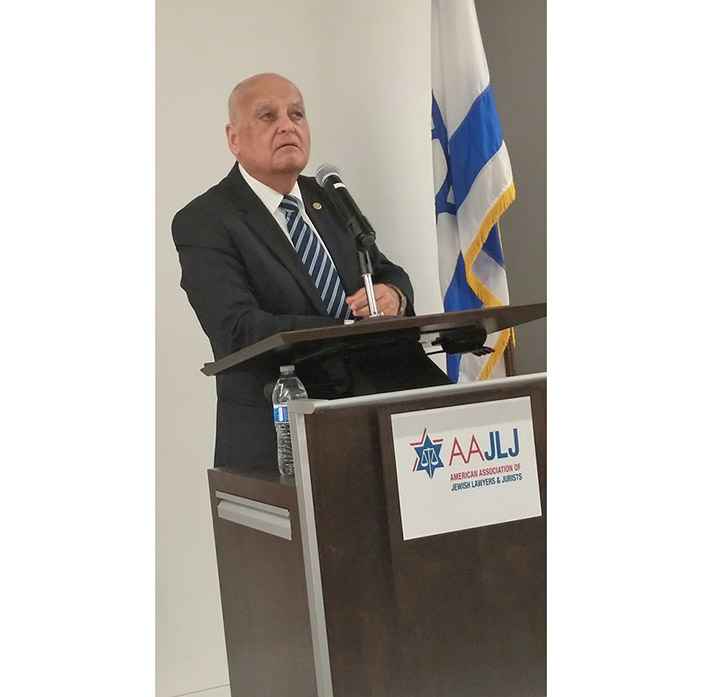
(Courtesy of AAJLJ) In an event presented by the American Association of Jewish Lawyers and Jurists (AAJLJ) on March 6 at the Greenberg Traurig law firm in Florham Park, entitled “Adjudicating in the Middle East: My Time on the Israel Supreme Court,” Stephen Greenwald, Esq., president of AAJLJ, introduced Justice Salim Joubran to a room of AAJLJ members and other New Jersey attorneys. In his glowing introduction, Greenwald echoed the words of many in the Israel government and society in his emphasis that Joubran is truly “an Israeli patriot.”
Justice Joubran began his speech to the audience by saying, “I am an Israeli, an Arab, a Christian, a Catholic, a Maronite.” Recently retired deputy president of the Israel Supreme Court, he has a singularly important story to tell in an international political landscape characterized by strife and divisiveness. As the first Arab to be permanently appointed to the Israel Supreme Court, Justice Joubran voluntarily assumed the role of defender of the rights of minorities.
Born in Haifa in 1947 during the Arab-Israeli war, Justice Salim Joubran and his family left Haifa for Beirut. They were refugees for six years, but in an extraordinary case, he and his family were granted permission to return to Israel. Joubran and his family eagerly returned to their homeland, but Joubran’s desire to find a place where he could belong, without compromising any aspect of his identity, would become a lifelong struggle.
During his studies at the Hebrew University of Jerusalem, where he received his JD degree, Joubran lived with two young men from a Hebron yeshiva. At one point he was arrested by the Israeli police on suspicions of being a spy.
In an anecdote, Justice Joubran spoke of how his son one day asked him for a kippah, and though at first he found this absurd because his son was not a Jew, Joubran then decided, when he was speaking in a synagogue in Berlin, to ask the rabbi if he could keep the kippah he was wearing and give it to his son. The rabbi agreed and gave him a second kippah for himself. His son was attending a Jewish school in Israel, and his friends wore kippot, so he wanted to be like them.
When Joubran was elevated to the Israel Supreme Court in 2003, and permanently in 2004, the Arab minority in Israel, one of the largest minorities in the world, could not help but celebrate this small victory. Joubran became a vocal advocate for the rights of Israeli Arabs, fighting for better opportunities for their education, employment and housing.
Though Justice Joubran was a champion of minority rights, he never forgot his role as arbiter of justice. While some of his decisions were unpopular among Israeli Jews, other decisions were equally unpopular among Israeli Arabs. In his conversation with the attendees at the luncheon, he was most intent not on boasting of his record, but of reminding everyone that, in his own words, “Judges are human beings.”
In one of the more emotional moments of his talk, Joubran spoke of a Palestinian child named Maria, whose family was killed in Gaza. Maria and her father survived, but they were brought to Israel for medical treatment and rehabilitation for five years. Human rights organizations had filed a Supreme Court petition on Maria’s behalf against the Israel Defense Ministry. During her hearing before the Supreme Court, Israeli Justice Edmond Levy began speaking to Maria in her native tongue, Arabic, and the child became emotional. In his display of recognition and respect for Maria’s humanity, Judge Levy demonstrated the power of personal interactions in breaking down barriers. Most Israelis do not speak the Arabic language, but Justice Levy not only knew the language, but spoke it to a child in order to make her feel more comfortable in a daunting situation. Justice Joubran is fluent in at least Arabic, Hebrew and English.
After his many years of undoubtedly witnessing some of the most disheartening human behavior, Justice Joubran maintains unwavering hope in the face of adversity and even blind hatred: “Once you meet people, you can change their attitude.” As a Supreme Court Justice, and as a man, he represents some of the finest qualities of humanity. That he was able to act in a position of influence while advocating for human dignity and liberty, we are grateful, and we can certainly hope that the justices on the Israel Supreme Court will continue to follow, and to lead, by his example.
Joubran’s service and his setting down clear lines of liberal jurisprudence have fundamentally changed Israeli society. The Judicial Selection Committee agreed that he would be replaced by another Israeli Arab, with Judge George Kara chosen as his successor. Though sometimes an enigma, Joubran was still, at all times, a trailblazer and an Israeli patriot.








